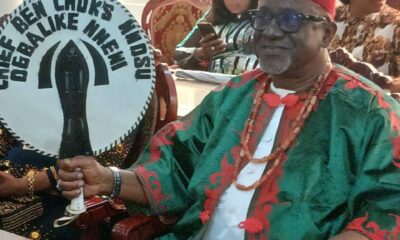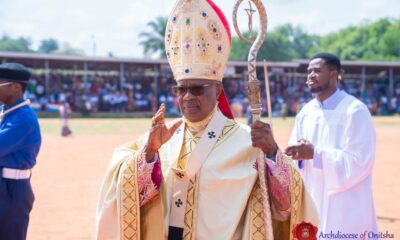Mazi Nnamdi Kanu, the detained leader of the Indigenous People of Biafra (IPOB), has submitted a new application to the Federal High Court in Abuja requesting the dismissal of all criminal accusations and his unconditional release from custody.
The application, labeled “Motion on Notice and Written Address in Support” and dated October 30, 2025, contends that the charges lack legal foundation under Nigerian law, characterizing them as “no charge or counts cognisable within the corpus juris of the Federal Republic of Nigeria” and “a nullity ab initio for want of any extant legal foundation.”
READ ALSO: Nnamdi Kanu’s lawyer Aloy Ejimakor collapses in Kuje correctional centre
Representing himself in the proceedings, Kanu based his application on multiple constitutional and legislative provisions, including Sections 1(3), 6(6)(b), and 36(12) of the 1999 Constitution, alongside the Evidence Act 2011 and the Terrorism (Prevention and Prohibition) Act, 2022.
The IPOB leader requested the court to dismiss what he termed the “purported charge” in full, asserting that the prosecution’s case rests on legislation that no longer exists—namely, the Customs and Excise Management Act (CEMA), Cap C45, LFN 2004, repealed by Section 281(1) of the Nigeria Customs Service Act 2023, and the Terrorism Prevention (Amendment) Act 2013, repealed by Section 97 of the TPPA 2022.
Kanu argued that the repeal of these statutes renders the charges legally defective and contradicts the constitutional principle of legality outlined in Section 36(12) of the 1999 Constitution, which prohibits prosecuting individuals for offences not defined under current legislation.
He referenced the Supreme Court’s decision in FRN v. Kanu (SC/CR/1361/2022), where the highest court directed lower courts to acknowledge repealed or invalid legislation under Section 122 of the Evidence Act 2011. Kanu asserted that disregarding this mandate “renders all proceedings void ab initio,” referencing NNPC v. Fawehinmi (1998) 7 NWLR (Pt 559) 598.
The application additionally challenged the court’s authority regarding alleged offences purportedly committed in Kenya. Kanu pointed out that counts 1 to 6 in the charge sheet “contravene Section 76(1)(d)(iii) of the TPPA 2022,” which mandates certification from a Kenyan court establishing that such actions constitute crimes under Kenyan law before prosecution can proceed in Nigeria.
He contended that the prosecution’s inability to satisfy this requirement invalidates Nigeria’s extraterritorial jurisdiction and breaches Article 7(2) of the African Charter on Human and Peoples’ Rights.
Citing Section 1(3) of the Constitution, Kanu insisted that any legislation or legal process conflicting with the Constitution is invalid, asserting that his ongoing prosecution and imprisonment lack constitutional legitimacy.
The IPOB leader also referenced previous judicial decisions, including Aoko v. Fagbemi (1961) 1 All NLR 400 and FRN v. Ifegwu (2003) 15 NWLR (Pt 842) 113, where courts invalidated convictions founded on non-existent criminal provisions.
Kanu requested the court to mandate that the prosecution provide a response limited to legal arguments within three days and to issue its decision by Tuesday, November 4, 2025.
He emphasized that his submission “hinges on pure questions of law derivable from the Constitution, the TPPA 2022, the Evidence Act 2011, and the court record,” making supporting affidavits unnecessary.
“The Defendant/Applicant has complied with this Honourable Court’s directive of 27 October 2025 by filing a comprehensive written address asserting that no valid or cognisable charge subsists against him, either under extant Nigerian statutes or any law recognized in Kenya,” part of the motion reads.

 News3 weeks ago
News3 weeks ago
 Features4 weeks ago
Features4 weeks ago
 News3 days ago
News3 days ago
 Features5 days ago
Features5 days ago
 News2 weeks ago
News2 weeks ago
 Uncategorized2 weeks ago
Uncategorized2 weeks ago
 News4 weeks ago
News4 weeks ago
 Entertainment2 weeks ago
Entertainment2 weeks ago























